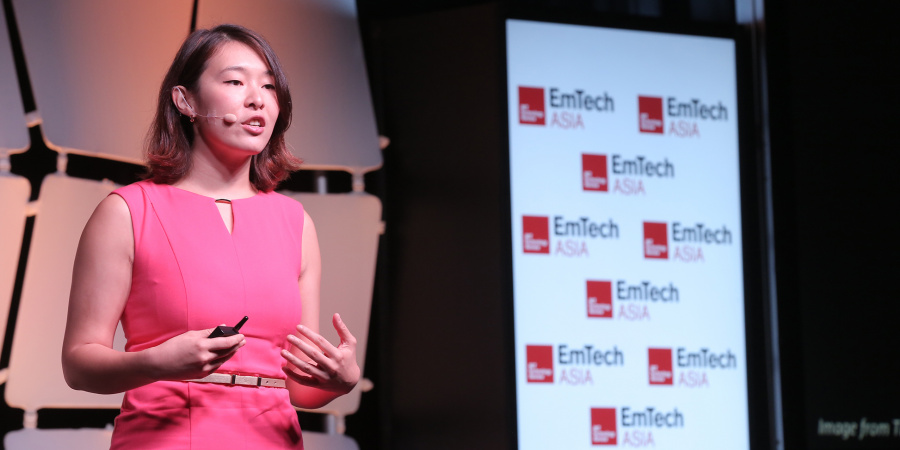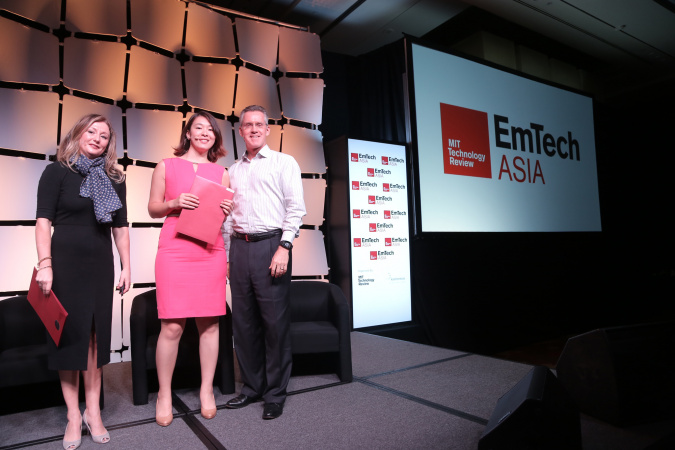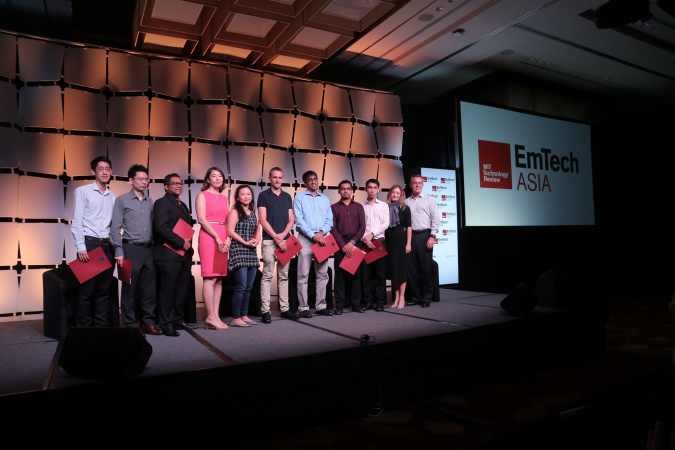Young Innovator, Named Asia’s Top 10, Shares Visions of Making a Difference
Prof Angela Wu, Assistant Professor in the Department of Chemical and Biological Engineering and the Division of Life Science, shares her positive attitudes towards life and engineering with the ‘‘Women in Engineering’’ series after becoming one of MIT Technology Review magazine’s Top 10 Innovators Under 35 in Asia
“I am extremely excited as well as humbled to be named along with candidates who are doing amazing things with strong profiles,” said Prof Wu. The young professor has been awarded for two of her important contributions: her work at Agenovir Corporation which is a start-up she co-founded to use genome editing technologies to treat diseases associated with viral reservoirs, as well as for her work on the human cell atlas in relation to HKUST.
The “Innovators Under 35” list in Asia recognizes the development of new technology or the creative application of existing technologies to solve global problems in industries such as biomedicine, computing, communications, energy, materials, web, and transportation. Honorees were given tribute at MIT Technology Review’s EmTech Asia conference held in Singapore. As one of the 10 regional awardees, Prof Wu will automatically qualify for consideration on the global “35 Innovators Under 35” list to be showcased in the fall of 2017.
Drawing Google map for human cells
At EmTech Asia 2017, Prof Wu vividly explained her work. “The human body contains trillions of cells, each carrying a copy of the genome which is similar to the instruction manual telling the cell what to do and how to function. Currently, researchers take millions of cells from an organ and study their average genomic profile ─ which does not tell much about each individual cell.”
She continued, “Thus to help create a human cell atlas like a Google map to give us the location, function and role of each individual cell, I designed microfluidic devices to isolate individual cells. We can then read and analyze their genome individually at the single cell level and discover mistakes such as mutations.”
At Agenovir, she uses genome editing technology to specifically target and delete virus inside the genome and correct the mistaken sequence in order to cure the disease. Targeting destruction of viral DNA instead of human DNA, the biomedical firm aims to remove viruses from the cell in order to introduce permanent cure.
At HKUST, her research focuses on single cell analysis techniques and genomics to answer questions about tumor initiation, as well as how DNA mutations and cancer stem cells may both be involved in the process. “Currently, people who study cancer from the DNA mutation perspective found evidence that cancer is a disease caused by these mutations; on the other hand, those who study cancer and their growth have evidence that there may be a so-called cancer stem cell giving rise to the rest of the cancer. So far there is no way to directly connect these two phenomena,” she said.
Prof Wu’s lab at HKUST thus uses microfluidic tools and genomic analysis to try and find the answer, which she believes will lead to more avenues of treatment and prevention of cancer. The team is also involved in clinical translation by developing DNA-based diagnostics for the intensive care unit in collaboration with Prince of Wales Hospital and Chinese University of Hong Kong.
Female engineer changing the status quo
Prof Wu’s research reveals her passion in making a difference. She is particularly intrigued by engineering which makes a positive impact on people’s lives by finding innovative solutions to problems. Bioengineering in particular, bridging the gap between basic science and their application in people’s lives, helps average people associate with science and engineering.
Interestingly though, Prof Wu initially took Biology merely because her “tiger parents” found it promising. Before long however, she became genuinely interested and propelled by her own sense of curiosity as the field helped her learn about how things work in the infinite world. She had her Eureka moment during her first single cell experiment where she imaged cells and saw individual little cells being caught in each chamber inside a microfluidic biochip at unprecedented resolution. “I felt like, wow, I’m one of the very first people to do this! It was really exciting,” Prof Wu recalled.
While encouraging people to pursue engineering, especially those with curious minds, passion for problem solving and solid foundation in related fields, she acknowledges that being a female engineer and entrepreneur does make her a member of the minority group. There are chances of being stereotyped, having difficulty in identifying female role models, and feeling alienated at times.
Probably in tune with her passion in solving problems however, she finds being a female engineer most rewarding and empowering at the same time. “When I am presented with these challenges, it feels extra-good to overcome them. I hope more women will consider engineering as a career to change the status quo and to say ‘I can do it too’,” Prof Wu noted.
She is glad to see more people becoming champions of minority groups in engineering, and she finds HKUST’s Women Faculty Association the perfect example of the support she is receiving from both male and female colleagues alike.
Her can-do attitude is not only about getting the results, but appreciating the process as well. “In engineering as well as in life: Focus on the process and not just the end goal. Sometimes you may have a result in mind when you start, but if you focus on the process and have fun with it, you may end up with something even better than you imagined!”, she shared.
Entrepreneurship: TEAM, TEAM, and TEAM!
The same applies to the entrepreneurial process, for which she finds teamwork most important. Prof Wu has a genuine interest not only in impacting people but also in working with them. “Entrepreneurship is about TEAM, TEAM, and TEAM! With a great team, even if you started with the wrong goal, you will be able to get back on the right track while enjoying every moment working and overcoming hardships together. Even if your venture fails, you will still have learned from and enjoyed a fabulous experience with the great team. Without a compatible and capable team however, even the best product may fail.”
Prof Wu considers the founding of Agenovir with her PhD advisor in 2015 a milestone in her career. Doing work with CRISPR and genome editing in the viral space, the company has since then demonstrated the technology’s applications in cutting out cervical cancer-causing HPV and also herpes virus to cure the diseases.
As a scientific advisor to Agenovir now, she still enjoys the entrepreneurial aspect of bringing useful technologies to the market to be applied in labs by scientists or in clinics to help patients. The experience also helps her explore the notion of bringing an academic concept into a commercial setting.
Drawn to HKUST’s academic culture
While having a start-up, Prof Wu continued to climb new heights and joined HKUST which attracted her in many ways. During interviews with Asian institutions, she found HKUST to have the most open and independent academic culture. Its faculty members were productive leaders in various fields and its students were inquisitive and motivated. She was particularly impressed by the international and culturally-diverse faculty and student bodies, and of course the gorgeous seaside campus.
One and a half years have passed since then, and she has been having a good time with colleagues with whom she frequently engages in intellectually stimulating discussions that lead to new research ideas.
As to the future, Prof Wu is happy to keep an open mind while she enjoys the process of learning to be a professor and the leader of a research group. More specifically, she will continue to find intriguing engineering problems with an impact on human health, and facilitate the real-world application of her innovations in clinics and other venues. Last but not least, she aspires to be a good mentor and colleague with positive interactions with her students and counterparts.
“As an engineer, we have to be dedicated to and passionate about our work. Having said that, work-life balance is important – work hard and play hard, stay healthy, be happy and be wise,” Prof Wu shares her motto which is again filled with positive energy.
Profile:
Born in China and raised in China, Australia and Hong Kong, Prof Angela Wu obtained her BS in Bioengineering from UC Berkeley, and her MS and PhD in Bioengineering from Stanford University in the US. At Stanford, she was awarded the Bio-X Bowes Scholarship for interdisciplinary research, and the prestigious Siebel Scholarship for top bioengineering graduates. In 2015 she co-founded Agenovir, a therapeutics company with the mission of treating diseases associated with viral persistence. She joined HKUST in December 2015 as an Assistant Professor jointly appointed by the Division of Biomedical Engineering (BME) and Division of Life Science. With the integration of BME and the Department of Chemical and Biomolecular Engineering to form the new Department of Chemical and Biological Engineering (CBE) on July 1, 2017, she joined the new CBE on July 1 accordingly. She became one of the top 10 young innovators under the age of 35 in Asia awarded by MIT Technology Review in 2017.
Since 1999, MIT Technology Review has been recognizing young innovators whose inventions and research were found most exciting in its Innovators Under 35 list. The regional editions of the list were launched in 2010 and now there are regional versions in Asia, Italy, France, Spain, and several countries in Latin America. The Asia regional list started in 2014 and now, in its 4th edition, 40 regional innovators in Asia have been named.
Related link:



